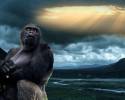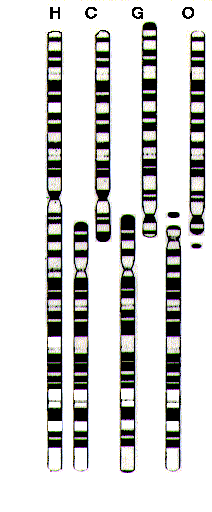Book Review - God- or Gorilla?, Chapter 18
This entry is part of a series. For a bit of an introduction and an index of all entries in the series, go here.
 This installment covers Chapter 18, The Mason Bee.
This installment covers Chapter 18, The Mason Bee.
There's nothing in particular about the following passage - I just thought this was funny.
The clash between monophyletic evolution on the one hand, with its rejection of God, and polyphyletic variation on the other with its fixed laws, plan and purpose, merely serves to emphasize the vagueness and uncertainty of the materialist's extravagant speculations and to show the loss of an objective worthy of the pursuit of rational man. (McCann 222)
First I have to deal with people saying bees show my own field of aerodynamics is impossible. Now, I see McCann saying that it also shows that evolution is impossible.
The materialist encounters in the bee an insurmountable obstacle which would be no obstacle at all if the Creator were not rejected. (McCann 222)
Monophyletic evolution demands acceptance of the theory that the bee was evolved from a lower organism which neither made honey nor built a hive, notwithstanding the fact that the one distinguishing characteristic of the bee is that it is the only creature in nature that does both, though no explanation of its instinct as a honey gatherer and hive builder has ever been offered. (McCann 223)
Hmm. Wasps couldn't be seen as any type of analog as a precursor to bees, huh? As a kind of communal insect that makes hives but not honey?
This one doesn't exactly have to do with evolution, but it is pretty insulting to the non-human animals he's describing.
Much has been written about the "singular intelligence" of the bee. It has been compared to human reason just as the intelligence of dogs, seals, and other animals has been compared to human reason, as if upon the brains of some of them, learning their tricks, the human intelligence of the teacher had not been imposed. (McCann 225)
I've never understood how a person could have pets, and not recognize the personality and intelligence of those creatures.
McCann posed the following strange argument from instinct.
Who forms the plan of the bee? (McCann 226)
Yet even the untrained observer detects the strained quality of these theories of chance evolution. He notes that acquired habits vary, but that instinct never varies. (McCann 226)
The plan of the bee, obviously, comes from instinct. No higher intelligence plans it. But where he goes off the rails is in saying that instinct never varies. Why not? Instinct is just one more trait controlled by our genes. If physical traits can vary with genetic mutation, why wouldn't instinct, also?
McCann seems to think the chicken and the egg is a serious problem for evolution.
If the specific law is that each species comes from the germ of its own species, every bee since the first has been hatched from the egg of a pre-existing bee. Whence came the first pre-existing bee? Like begets like. We get no bee, except from the egg of another bee. (McCann 227)
This is the very question that evolution explains. Every parent begets offspring very similar to, but not exactly like, themselves. The changes from generation to generation may be very small, but these changes can add up to a lot over time. Think back to my example from a previous installment of short necked animals evolving into long necked animals, where the average neck length of the population only changed 1 mm per generation. From generation to generation, nobody would notice any big differences between parents and offspring. But after a thousand generations, the population would look quite a bit different than their many times great grandparents.
If you were to somehow travel in a time machine, tracing the ancestry of a given bee hive, you wouldn't notice any big changes from generation to generation. But, you would notice that the ancestors become icreasingly different from the modern day hive. Initially, they would still be bees, just slightly different. Then, they would still be bee-like, but not quite bees. Keep going further and further back, and you'd find insects that weren't bee-like at all, and even further into the past, it would be a worm-like population of animals. You could keep tracking the ancestors until eventually you got back to the first life on the planet, never noticing a big change from one generation to the next.
Modern creationists would be very familiar with the following argument, only now they've given it the term 'irreducible complexity'.
The chance evolutionist suggests a low form of pre-existing honey-gatherers and a low form of pre-existing cell-makers as the ancestors of the bee. But if this be true, the first product of the chance evolution must have been equipped with an apparatus for gathering honey and a plan for making cells. The bee couldn't have acquired this apparatus SLOWLY. It couldn't have developed its tools and its skill SLOWLY for the reason that its offspring could have survived no such delay. (McCann 228)
I don't know much about bee evolution, to be honest, but seeing as how many types of animals make nests/dens to raise their young (birds, ants, wasps, mammals), and many types animals produce a nourishing food for their young (some birds, mammals, honey pot ants), I don't see why the two would have had to have evolved together in bees. Perhaps the ancestors of bees simply made the cells to protect their young, and then co-opted that already existing structure to store honey. Cells and honey would each have been useful independent of the other.
Here's the same 'irreducible complexity' argument concerning mammals.
How could the new-born infant of a mother who had not yet developed mammary glands survive the delay of ages until chance evolution might succeed in developing mammals capable of suckling their young! ... But Darwin himself also says that the mammals have descended from the marsupials, and instantly we have a new set of complications in which the opossum, the kangaroo and the turkey become the most bewildering riddles of the chance evolutionist's scheme. Since Darwin's time no evolutionist has attempted to explain how, by chance evolution, the offspring could have survived the millions of years which are said to separate the marsupial from the mammal while the latter was evolving from the former, or, in other words, until the mammary glands of the mother could be developed beyond the pouch stage. (McCann 228-229)
Nobody except naive creationists expects that prior to the development of mammary glands, that our ancient ancestors gave birth to completely helpless young that would have starved to death. I think it's much more likely that nurturing behavior would have evolved first (such as in birds), and then later, mammary glands would have developed initially as a supplementary food source for the young. And then only much later than that would mammary glands provide the primary food source for infants.
Speaking of mammary glands, I think the platypus and the echidna are a very good example of what 'primitive' mammary glands would have been like in our ancestors. They produce milk, and excrete that over a region of their body, but they don't have ducts to transport the milk, nor nipples where the babies can latch on to suckle.
This line of reasoning is actually a bit funny.
All theories of chance evolution repudiate plan, purpose and definite intention, yet the sting of the bee is certainly an organ of definite intention. (McCann 229)
Because having to commit suicide to defend your colony shows clear intent in design. It's even worse when you consider other animals have evolved stingers that don't leave them dead after using them.
I really, really wish McCann could see the fossils coming from Liaoning.
On the theory that special organs, designed for a particular use, were developed ever so slowly before the time came when they might be used, it would be necessary for birds, evolving from reptiles, to acquire feathers gradually through thousands and thousands of generations before such feathers could be used for flight, and, of course, during all this period of development there would have had to be another and equally marvelous co-ordination of development in the direction of flying bones and flying muscles, and a still more marvelous co-ordination, all by chance, whereby the center of gravity of the bird would fall within the limits of flight. (McCann 229)
This is exactly what has happened. Feathers originally evolved in dinosaurs, having nothing to do with flight. Flight like feathers might have evolved originally for display purposes, or maybe even for extra thrust to aid the dinosaurs while running. Later, these already developed flight like feathers would have been used for actual flight (either short powered flights or gliding). And considering that an animal can move its limbs to adjust its center of lift, it wouldn't have been hard for the CG and center of lift to be in the correct locations relative to each other. Once rudimentary flight had been developed, then natural selection would have favored modern asymmetrical flight feathers.
More info:

